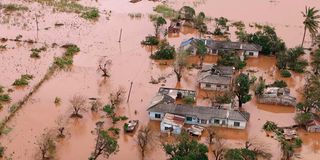Why Africa must rise up and build a sustainable future

A picture shows houses in a flooded area of Buzi, central Mozambique, on March 20, 2019, after the passage of Cyclone Idai.
As an African, I have seen first-hand the devastating effects of climate change. I have met communities displaced by floods in Malawi, Mozambique and Zimbabwe. I have spoken to farmers from Northern Kenya who have lost their crops to drought.
These experiences have made me acutely aware of how urgent it is to address global heating. In fact, the world stands perilously close to breaching the threshold of a 1.5-degree temperature rise, beyond which unimaginably catastrophic and irreversible climate impacts will engulf Africa.
Yet, the rich countries that caused this crisis are still refusing to give up their addiction to fossil fuels, and still short-changing the Global South on the funding needed for climate action.
African leaders have a crucial opportunity to tackle these challenges. The Africa Climate Summit is the moment for leaders to agree on a strong action platform, not only for pan-African measures but also for global decisions due to be taken at the UN Global Climate Summit (COP28) in November. Achieving a robust common agenda depends on three key factors.
A people-centred approach: The summit must put the needs of the people at the heart of its deliberations. The voices and needs of women, the youth, and indigenous people must be given priority over those of foreign companies and donors.
A justice approach: This means making sure that the benefits and costs of climate action are equitably distributed. Both within countries, so that women, informal workers, indigenous people and other vulnerable groups don’t lose out. And between countries, so that rich countries, which have done most to cause the crisis, shoulder more of the burden than developing countries.
A collaborative approach: The summit must be a genuine collaborative effort between governments, civil society, and the progressive private sector. Firstly, Africa and the world must rapidly transition away from fossil fuels.
African governments and foreign donors and investors must put an immediate stop to the expansion of the fossil fuel industry and ensure that no new fossil fuel projects are financed, licensed, or constructed.
Secondly, divert investments and subsidies from fossil fuels to Africa’s vast renewable energy potential. But the priority should be to spur inclusive, gender-transformative and sustainable development within Africa, not to meet the export appetites of foreign countries and companies. As Hivos has demonstrated in the Energia program, decentralised, community-owned renewable energy solutions are key to create opportunities and jobs for women, small and micro businesses, youth, farmers and other economically marginalised groups.
Lastly, the summit must loudly redouble Africa’s calls for a transformation of the global climate finance system. Africa needs massively increased, non-debt-creating finance for adaptation and loss and damage, as well as for energy and food transitions. The summit is a critical opportunity for African leaders to take action on climate change.
Together, we can build a fairer, more sustainable future for Africa.
Mr Mugochi is the Regional Director, Hivos East Africa





